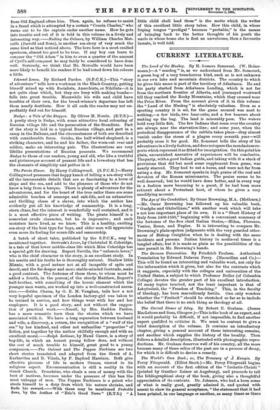A batch of short tales, published by the S.P.C.K., may
be mentioned together. Gertrude's Lover, by Christabel R. Coleridge, is a tale of that lower middle-class life which Miss Coleridge has a special gift for drawing. Rupert Neville, the "unheroic lover," who is the chief character in the story, is an excellent study. In his merits and his faults he is thoroughly natural. Shallow little Minnie, with a good nature not at all incapable of spite and deceit, and the far deeper and more stable-minded Gertrude, make a good contrast. The fortunes of these three, to whom must be added a fourth, in the person; of the sturdy Matthew, Rupert's half-brother, with something of the heroic element which the younger man wants, are worked up into a well-constructed narra- tive.—Golden Chains, by G. E. M. Vaughan, tells how a not very hopeful specimen of the London factory-girl was taken to be trained in service, and how things went with her and her employers. It is a good story, and not without the sugges- tion of practical work.—Nowell, by Mrs. Haddon Parkes, has a more romantic turn than the stories which we have associated with it. We have a long separation between husband and wife, a discovery, a return, the recognition of a "waif of the sea" by her kindred, and other not unfamiliar "properties" of fiction, put together by the author skilfully enough and with an excellent moral.—Ralph Latimer, by Mend Carew, is a story of boy-life, in which an honest young fellow does, not without the cost of much trouble to himself, great good to a young companion.—The Outcast and The Pappas Narkissos are two short stories translated and adapted from the Greek of A. Karkavitea and D. Vikela, by F. Bayford Harrison. Both give effective pictures of life in modern Greece, viewed in its religious aspect. Excommunication is still a reality in the Greek Church. Demetrius, who steals a sum of money with the best of motives, becomes under the pressure of this ban the most unhappy of men. The Pappas Narkissos is a priest who steels himself to a duty from which his nature shrinks, and finds his reward.—With these may be mentioned Probable 8ons, by the Author of "Eric's Good News " (R.T.S.) " A
little child shall lead them" is the motto which the writer of this excellent little story takes. How this child, in whose lisping tongue "prodigal" becomes "probable," is the means of bringing back to the better thoughts of his youth the uncle in whose home she is first an unwelcome, then a favourite inmate, is well told.


















































 Previous page
Previous page